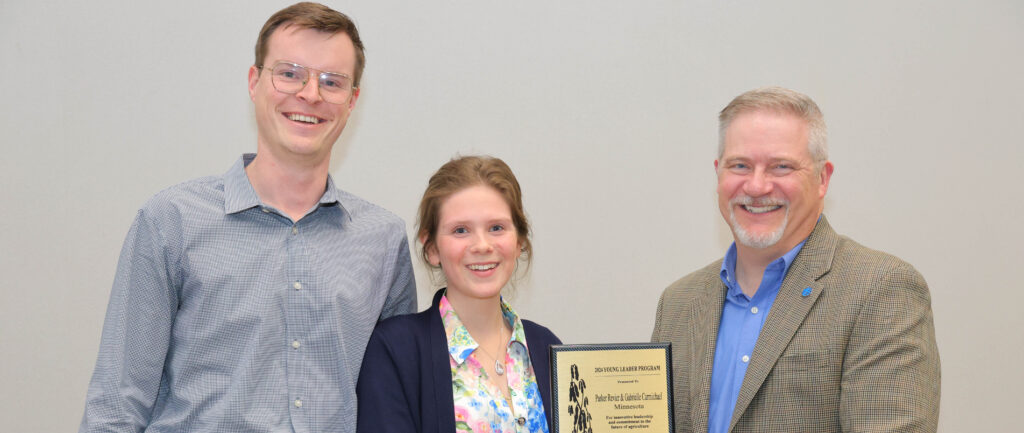This article appears in the May-June issue of Soybean Business Magazine. Click here to read the digital issue.
Many farmers across Minnesota are still hitting the books and adding to their curriculum vitae by attending Farm Business Management college courses. These classes, however, aren’t held in a classroom. They’re taught across their kitchen table.
Farm Business Management (FBM) has been in Minnesota since the early 1950s. Students register for credits through the collegiate institution their instructor is based out of and can complete several different diplomas through the FBM program.
Tina LeBrun, an FBM instructor at South Central College, along with other FBM instructors, emphasizes the focus on record keeping with her FBM students.
“The foundation of Farm Business Management is record keeping,” he says. “We work on everything on the management side of the farm operation.”
Rob Rick, Lebrun’s FBM colleague, says the program’s mission statement is based around supporting farmers.
“It’s another set of eyes to look at the paperwork and offer an opinion, but at the end of the day, I am on the farmer’s side,” says Rick, who has taught in Central Lakes’ FBM program for 19 years. “I’m their advocate.”
The FBM program is operated through the Minnesota State Colleges and University Systems with management at the two agricultural centers of excellence – AgCentric at Central Lakes College in Staples and the Southern MN Center of Agriculture at South Central College in North Mankato.
“The key is our face-to-face, one-on-one education. We are sitting down at their kitchen table, we drive from farm to farm,” Rick says. “We see their operation, and we know their family. We are devoted to their operation.”
LeBrun says one of FBM’s strengths is its flexibility.
“Along with those kitchen table meetings,” he says, “we give our farmers the option for formal ‘classroom’ style education through meetings and seminars on topics like crop insurance, the farm bill, and farm transition.”
FBM truly shines at crunching the numbers that lenders need to evaluate a farm operation for obtaining operating and input loans. Students work through the plans and scenarios for their operation ahead of time with their instructor. Paul Lanoue, dean of Agriculture and Business Management at Minnesota West Community and Technical College, recognizes the many financial components that may comprise a lending package.
“Character level is an important factor with a bank, and our farmers already know their business’ short falls,” Lanoue says. “Our students have a deeper understanding of making the right financial decision before they visit with their lender.”
“Many farmers aren’t prepared to go visit their lender. We work with the farmers to understand the cash flow implications of every decision, and challenge them to know their bottom line,” Rick says. “The farmers we work with know exactly what it will cost to grow a crop or raise an animal.”
LeBrun agrees keeping the focus on farmers is key to a successful relationship.
“We take a hard look at what areas the farmers we work with are excelling in, where they can improve, and what changes need to be made to put that extra dollar in their pocket,” LeBrun says.
Although instructors focus on financials, they often find themselves as a key member of the team a farmer needs when discussing the tough issues around farm transitions, expansions and more.
“We help facilitate those conversations, sit in on family meetings, and help answer the bigger question of how do we make an expansion, transition or something else work financially,” Rick says. “We put pencil to paper, help families create goals, and watch those goals transpire.”
The program has plenty of room to assist additional farmer-students that are looking to analyze their financials and plan for their business’ future.
“We are readily available to assist farmers looking to transition their operation, and explore how that works financially,” Lanoue says. “FBM has added instructors, and we encourage farmers to reach out to instructors directly if they are interested in joining the program.”
The program, however, is not immune to the current economic state of the farms they work with, and what that means for the mental health of the farmers they see.
“A lot of farmers are trying to keep their ship afloat right now. Everyone is feeling a pinch with the current price environment,” LeBrun says. “Right now, we are a cheerleader for our farmers. We have to work at boosting spirits and just be an open ear.”
Rick agrees.
“We have a great resource in Ted Mathews, a rural and mental health counselor for FBM students, “Rick says. “He truly assists the families that we work with that express a need during tough situations on a farm whether that is divorce, stress, depression, children issues, illness and more,” says Rick.
Ultimately, Lanoue says FBM staff are looking out for farmers.
“Our farmers are our people,” Lanoue says. “We are rooted in their operations, and care deeply about their success.”




